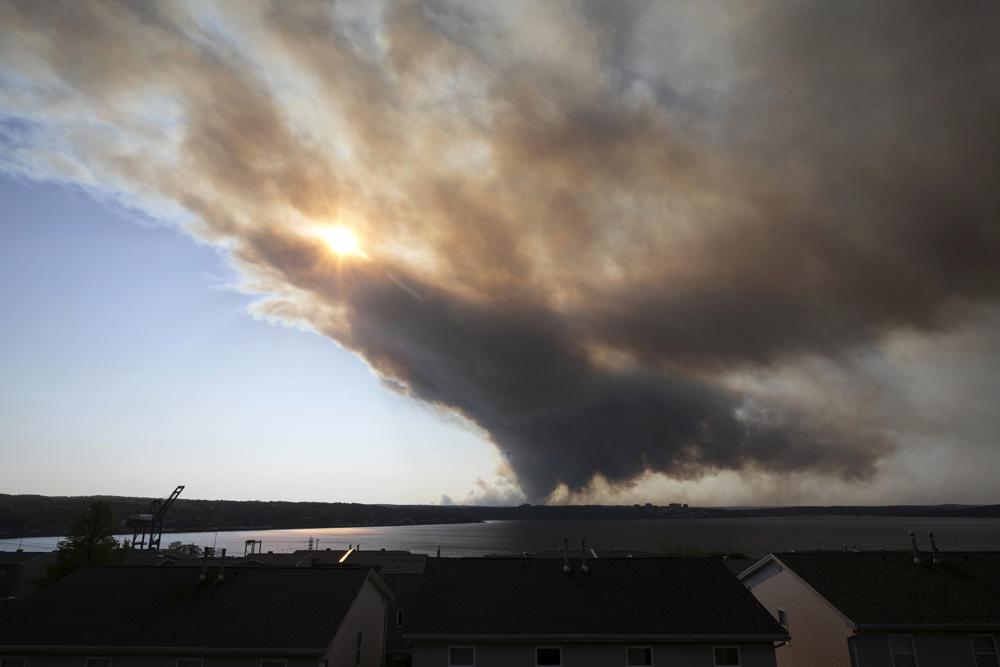As with much of the eastern United States, central North Carolina experienced a hazy Tuesday night and start to Wednesday. Smoke from the latest round of wildfires in eastern Canada traveled south and east, with the air pollution arriving in Orange, Chatham, and Durham counties and creating atypical air quality.
With some of the fires now being contained, how long might the Triangle be affected by the smoke?
Chrissy Anderson, a meteorologist with the NWS in Raleigh, said the smoke traveled to North Carolina following a weather front that moved from eastern Canada south. While air pollution from the fires caused some of the darker skies, she said low clouds from the front added to the gray morning on Wednesday.
Those clouds could bring some evening showers, the meteorologist said, which might help move away some smoke in the short-term.
“We’ll continue to see that for most the day — gray-ish, hazy skies,” Anderson said on Wednesday afternoon. “We’re expecting some showers, light precipitation, this afternoon and evening and that could clear up the haze a little bit. It could make it more foggy, actually, in some areas.”
🌧️ Hazy skies, increasing cloud cover, and rain moving in from the north will lead to highs 5 to 10 degrees below normal today.
🚨 Reminder: An air quality alert is in effect until midnight tonight for all of central NC! pic.twitter.com/ypFmc1LrqZ
— NWS Raleigh (@NWSRaleigh) June 7, 2023
That doesn’t mean, however, that the Triangle will be completely in the clear from the wildfire smoke.
“Tomorrow,” said Anderson, looking ahead to Thursday, “we’ll have another round of haze and smoke come from the north as this frontal boundary pushes out to the southeast. Smoke and haze will come in again and it should clear out in a Thursday [into] Friday timeframe. It should definitely be cleared out by Saturday.”

Thick plumes of heavy smoke fill the Halifax sky as an out-of-control fire in a suburban community quickly spread, engulfing multiple homes and forcing the evacuation of local residents, in Halifax, Nova Scotia, on Sunday May 28, 2023. (Kelly Clark/The Canadian Press via AP)
As of Wednesday, the Canadian Interagency Forest Fire Center reported 2,132 fires in 2023 — more than one thousand of which have happened in the last month. In recent days, the largest wildfire recorded in Nova Scotia led to thousands of residents evacuating. While the northeast United States already experienced some air pollution from the blazes, it worsened to the point this week where air quality alerts were issued this week.
Central North Carolina is experiencing far less smoke than other affected areas, but it still landed in the “unhealthy” designation of the U.S. Air Quality Index on Wednesday.
“We do have a Code Red alert,” described Anderson, “That means fine particulates are in the air. So, people with asthma, breathing [problems] or health issues, they [will] want to make sure they stay inside through today, this afternoon, and evening.”
Code RED and Code ORANGE Air Quality Alerts for fine particulate matter have been issued statewide from midnight tonight (6/6/23) through midnight tomorrow (6/7/23) due to impacts from Canadian smoke transport #ncwx #airquality #AQI
For more: https://t.co/Res5iwfwVO pic.twitter.com/j4RIFo5Q5u
— NC Air Quality Forecast Center (@NCDAQ_Forecast) June 6, 2023
The U.S. Air Quality Index warns anyone spending time outdoors during a Code Red to monitor their breathing and whether they feel fatigue. Other symptoms of exposure to air pollutants include headaches, irritated eyes and throat, chest pains, coughing, and difficulty breathing.
There are also steps residents can take if they’re worried about the air quality within their living spaces. An easy one is keeping windows and doors shut as frequently as possible. Checking and changing the air filters in ventilation systems or adding filters can be added to box fans can remove miniscule air pollutants. Air purifiers can also do this.
More information about air quality and how it affects health can be found on the U.S. government’s AirNow website.
Chapelboro.com does not charge subscription fees, and you can directly support our efforts in local journalism here. Want more of what you see on Chapelboro? Let us bring free local news and community information to you by signing up for our biweekly newsletter.








